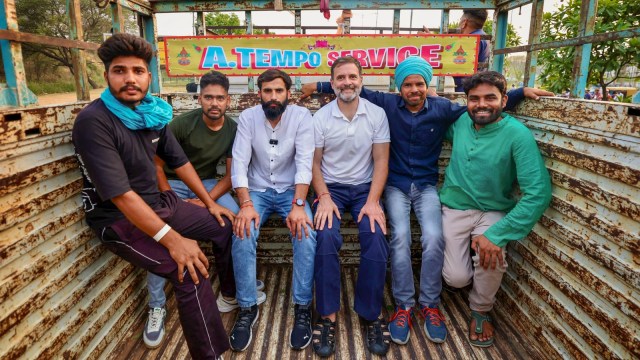
The exit polls, nearly across the board, are predicting a massive win for the BJP-led NDA in the general elections. Rather than speculating on the recently concluded polling for the 18th Lok Sabha (as psephologists and propagandists of all hues continue to do), it would be infinitely more meaningful to consider the path ahead. Irrespective of the outcome, there are some glaring inevitabilities and opportunities waiting to be exploited.
A pack of cards
On the eve of its centenary, the Rashtriya Swayamsevak Sangh (RSS) is at its nadir (which should have been its zenith given the Bharatiya Janata Party [BJP] is in office at numerous places). The Modi-fied BJP has ramrodded a profound restructuring, circumscribing the RSS’ power, and influence. This is outwardly marked by an excessive dependence on Prime Minister Modi (despite his carefully curated image as vikaspurush and pradhan sevak being severely dented in this election); the prioritisation of personal loyalty over ideological and organisational commitment; unprecedented centralisation in decision making — in governance and party matters; and the methodical circumscribing of alternative power centres, at the national and state levels. Consequently, internal fault lines within the RSS and the BJP, as well as between them, have reportedly widened irrevocably.
If the BJP retains office, the inexorable intra-party skirmishes will erode its organisational integrity. Prime Minister Modi and his chosen few will further depend on lateral political entrants, capital-intensive campaigns and a small committed bureaucracy. This will impede governance and our development trajectory, and harm the national interest. It will also exacerbate fatigue with the BJP, and India’s silent majority will soon be gasping for our desi version of a Kennedy/Obama — posing a futuristic vision, and driven by an inspiring mission.
360-degree politics: A prescription for INDIA
Whether the Indian National Developmental Inclusive Alliance (INDIA) is in government or not, the BJP is clearly gifting them enough to capitalise on, which necessitates urgent systemic reforms — organisational and programmatic. Notwithstanding drastic organisational changes, antiquated structures and symbolic programmes clearly have diminishing returns. To avoid being analogue players in a digital world, parties need to immediately experiment with innovations that address foundational problems, tap into new catchment areas and disrupt the status quo.
For example, parties must institutionalise new structures to evangelically work on the new frontiers of politics, including diaspora mobilisation, popular culture (books, films/serials, alternative [social] media etc.), civil society, community outreach, and religio-cultural organisations. Only then can they conscript all of India’s constituent units — academics, activists, professionals, diaspora, artists, community leadersm etc. in the pursuit of our normative goals. Focused and strategic engagement with these would yield sustainable political support — financial, operative and propagandist. Moreover, these can eventually be creatively leveraged in, and for statecraft.
But this requires party decision-making to be urgently streamlined, the constructive channelising of political personnel and programmatic dynamism. Rather than soporific gradualism, it is time to let younger blood (that’s hungry to prove itself and do something purposeful) to cut through the dreary sands of dead habit. While being tempered by institutional wisdom, India needs the vigour of the young to chip away the foundations of the Leviathan we face.
Actualising this entails a consensual recalibration with allies, who must reimagine the electoral, and eschew the quicksand of lacklustre methodologies. Given most progressives, political and non-political, might face concerted attacks if the BJP does indeed win, we must prioritise ideological politics whilst preparing for the next set of assembly elections. Only then can we reshape mass consciousness and tackle the problems of today and tomorrow.
Reviving the Congress Movement
Today, there is a pervasive belief that the BJP has misused institutions to gerrymander this election. So if it wins after it has failed us, many patriots will be even more determined not to accept the litany of villainies that we have suffered this past decade. Consequently, progressives will keep leveraging the numerous synergies they’ve forged (transcending formal political systems) to counter threats to India’s constitutional promise and civilisational ethos. Undoubtedly a testament to vast reservoirs of courage and idealism, these disaggregated forces need to now work collaboratively and imaginatively to actualise a national corrective. But to do this, civil society will need to bypass those who still cling to the performative or dogmatic, other potential allies, operate in silos and avoid the politico-cultural. In appropriating leadership roles, these few constrict civil society’s innate energies and unwittingly aid the BJP. To mount an effective challenge, progressives will need to avoid these traps and recreate civil society as federated nerve centres that empower millions across the nation.
Regardless of outcomes, India is poised on a precipice. It is, therefore, our historic duty to tackle future challenges and exercise ruthless pragmatism to shed all infirmities — internal and external. We must also work resolutely to a five-year plan to breathe life into our shared goals. Anything less will be a grave disservice to our people and our nation.
The writer is Samruddha Bharat Foundation’s Director and author of Bharat Jodo Yatra: Reclaiming India’s Soul


